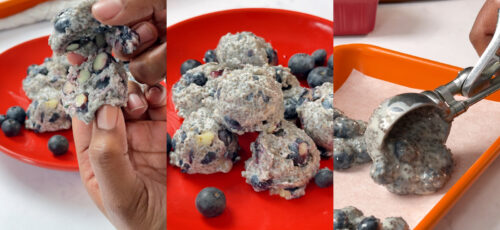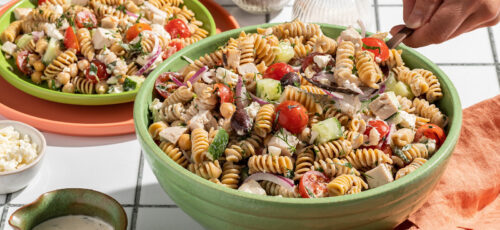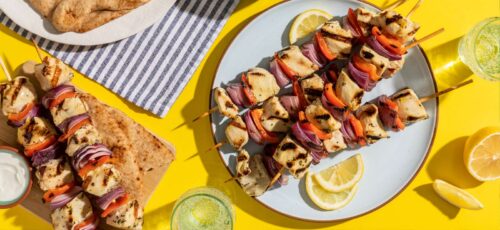
Personalized Nutrition is on the Rise
The Question is, Does it Actually Work?
For many, the new year means we refocus our attention on health and nutrition. While some individuals are intrigued by diet and nutrition trends, studies show that 95 percent fail. Meanwhile, others prefer a more personalized approach.
Personalized nutrition goes beyond weight loss or other fitness-related goals. For many, it may tell us how to control blood sugar and cholesterol better and what types of exercise will provide more benefits. It allows us to advance our health and well-being by tailoring nutrition recommendations and interventions to ourselves, considering our body type, age, health circumstances, and more.
The question therefore is, do personal nutrition plans actually work? The answer is yes.
A personalized nutrition plan involves changing habits, making them more sustainable and enjoyable. Let’s explore this further.

Why Traditional Diets Typically Fail
Lauren Harris-Pincus, MS, RDN, founder of Nutrition Starring YOU and author of The Protein-Packed Breakfast Club, shares this: “Personalized nutrition may be able to tell us how to control blood sugar and cholesterol better and what types of exercise will provide more benefits to the individual.”
Further, traditional diets typically fail because they are too restrictive and difficult to maintain. They require the dieter to completely change their eating habits and lifestyle, which can be challenging to sustain over time. These diets often involve the elimination of certain food groups or macronutrients, which can make it difficult to maintain a balanced diet.
Additionally, traditional diets are often too focused on short-term weight loss and don’t emphasize long-term health outcomes. This can make it difficult for people to stay motivated and stick to the diet, as they may not see sustainable results. Furthermore, traditional diets do not usually provide adequate guidance or support, dietary advice, or precise nutrition, making it difficult for people to stay on track.
Finally, traditional diets can often be expensive and time-consuming, making them difficult for busy or cost-conscious individuals to adhere to. No more. It’s time to break out of the mold and adopt a personalized nutrition plan.
How to Break Out of the Mold
Breaking out of the mold of traditional diets can be a great way to explore healthier, more sustainable food choices. Here are a few tips to help you get started:
- Start by focusing on an eating plan with whole, unprocessed foods. This means eating plenty of fruits, vegetables, whole grains, and lean proteins. Avoid refined sugars and processed foods as much as possible.
- Incorporate a variety of plant-based proteins into your specific diet. Legumes, nuts, and soy products can provide a good source of protein, fiber, and other nutrients.
- Choose certain foods that are in season whenever possible. Eating locally-sourced fruits and vegetables can help reduce your carbon footprint and provide you with the freshest, most nutrient-dense options.
- Experiment with new recipes and flavors. There is no one-size-fits all-approach here, so trying out new cuisines, recipes, and cooking methods can be a great way to spice up your meals and explore healthier options. Remember to assess how your body responds to new foods as you want to ensure your gut microbiome is adjusting well.
- Eat in moderation. Pay attention to portion sizes, and don’t forget to leave room for healthy snacks between meals.

Your Mindset is Key
Having the right mindset is key to building personalized nutrition plans. It’s essential to start with realistic goals. It’s important to set achievable goals that you can work towards. By celebrating the small accomplishments that you make along the way. Taking pride in your progress will help you stay motivated and focused on healthy eating.
It’s also important to stay open-minded and flexible when creating your meal plan. Experimenting with different foods, recipes, and meal plans can be a great way to find what works best for you and your lifestyle.
It’s also essential to have a positive attitude when it comes to making mistakes or having setbacks. Everyone makes mistakes or has setbacks, so being kind to yourself is critical.
Education, Education, Education
Education is critical in building a personalized nutrition plan because it helps individuals make informed decisions about their diet and lifestyle. With a better understanding of nutrition facts and labels, they can make more informed decisions about what to eat and how much. Education also helps to develop an understanding of the different types of nutrients, vitamins, and minerals that are important in maintaining good health. With this knowledge, it is easier to create a personalized nutrition plan that is tailored to the individual’s needs.
Education also helps identify any existing medical or health concerns that may need to be considered while creating your plan, such as metabolic syndrome or other health conditions. It is essential to understand your specific dietary intake requirements and how specific illnesses or medications may affect the body and how to adjust the diet accordingly.
A Focus on Habits
When seeking a personalized nutrition plan, it is essential to focus on building positive habits. This is because building positive habits helps create a lifestyle supporting optimal nutrition and health. Positive habits enable us to learn to make better food choices and develop healthy eating patterns, not to mention a positive relationship with food. Instead of associating food with guilt or deprivation, it’s essential to learn to appreciate the role of nutrition in overall health and well-being. Individuals can learn to enjoy meals and snacks without feeling guilty or deprived by focusing on positive habits.

Praise, Don’t Shame
Praise is a powerful tool that can help us become more mindful of our personalized nutrition. Praise allows us to recognize and celebrate our successes and better understand our dietary patterns. It can also help us stay motivated and on track with our nutrition goals.
When it comes to personalized nutrition, we must be kind to ourselves and praise ourselves for staying focused and committed. Reflecting on our successes and recognizing our strengths can help us stay positive and keep us motivated to maintain our nutrition goals.
One way to practice praise is to keep a journal and list three weekly wins regarding our nutrition habits. This could be anything from eating more fruits and vegetables to choosing plant-based proteins to drinking more water.
We can also practice praising ourselves when we make small but meaningful changes to our diet. Celebrating our successes, no matter how small, can help us to stay on track and motivated.
Positivity is Essential
Being positive when focusing on personalized nutrition is vital to achieving success. It is important to focus on the positive aspects of nutrition, such as how it can improve overall health, rather than the negative aspects. It is also beneficial to focus on the achievable steps that we can take rather than the long-term vision that may seem daunting. It is also important to stay motivated and find enjoyment in preparing and eating healthy foods.
Additionally, it is essential to remember that nutrition is an individual journey. Everyone’s journey is unique. Taking the time to appreciate the small successes along the way can help to keep a positive outlook.
Lastly, it’s beneficial to reach out for help and support when needed and to remember that it is okay not to have all the answers. With a positive outlook and the proper support, personalized nutrition can lead to excellent results.
Join a Support Group
Being part of a support group can provide a sense of community and encouragement. Group members can build relationships and share their experiences. This can provide comfort and reassurance as members learn to navigate their journey toward better nutrition.
Additionally, support group members can offer practical advice and tips to each other on how to make healthier choices. By engaging with other members, individuals can better understand the benefits of personalized nutrition and how to incorporate it into their lives successfully.
Furthermore, being part of a support group can provide an opportunity to discuss the challenges of personalized nutrition and offer solutions to help members stay on track. A group’s support can also help keep individuals motivated and accountable, helping them reach their nutrition goals.
Personalized nutrition goes beyond weight loss or other fitness-related goals. For many, it may tell us how to control blood sugar and cholesterol better and what types of exercise will provide more benefits. It allows us to advance our health and well-being by tailoring nutrition recommendations and interventions to ourselves, considering our body type, age, health circumstances, and more. The key is to develop a plan that is more sustainable and enjoyable.


















































